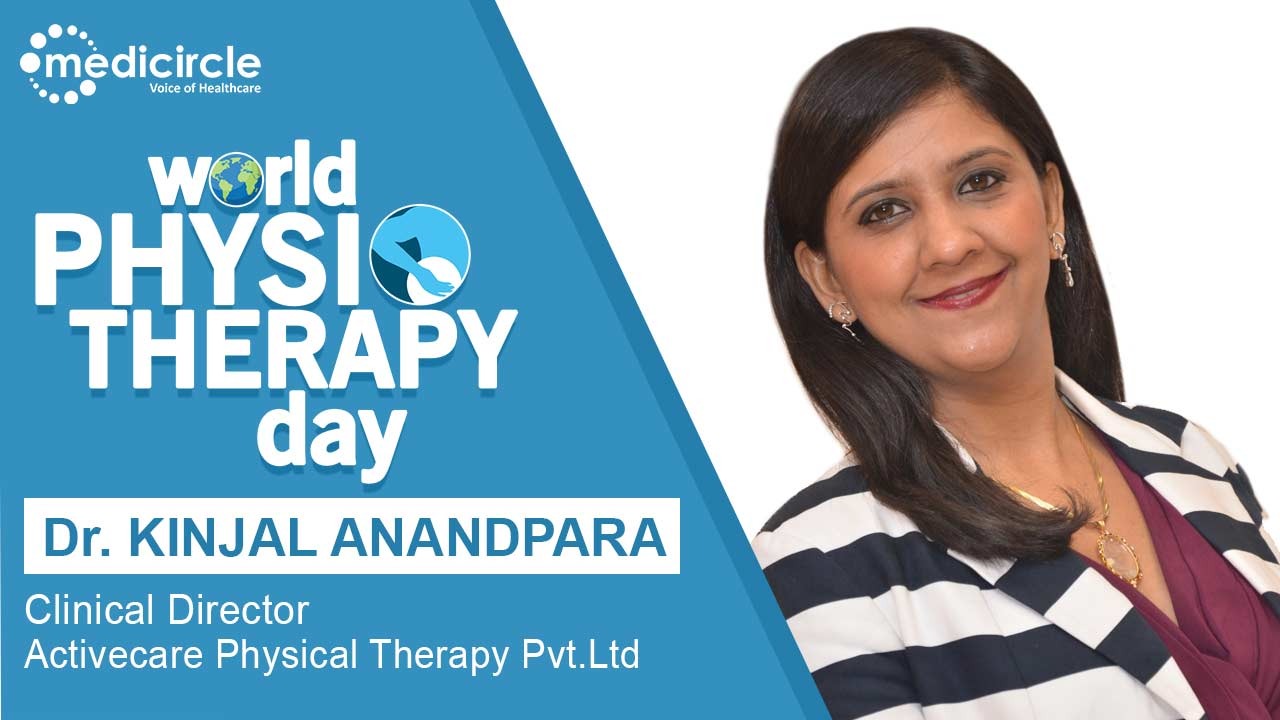Physical therapy helps individuals recover from an injury and develop, maintain, and restore maximum movement of the body and physical function. Physical therapy can also deal with a chronic condition and prevent future injury. World Physiotherapy Day was started on September 8 in 1996. The day founded in 1951 marks the solidarity of the global physiotherapy community. The theme this year is Long COVID and physiotherapy. This theme will focus on rehabilitation and long COVID and the role of physiotherapists in the treatment and management of people affected by Long COVID. We at Medicircle are conducting the World Physiotherapy day Awareness Series to raise awareness about the importance of physiotherapy and the role physiotherapists play in keeping people fit and well.
Dr. Kinjal Shah Anandpara is the owner and Clinical Director of ActiveCare Physical Therapy Pvt Ltd. Dr. Anandpara has received a Certificate of Orthopedic Manual Therapy from Curtain University in Perth, Australia. She has over 11 years of clinical experience in India and America. Dr. Anandpara has worked and trained in New York City at the original ActiveCare Physical Therapy. Dr. Anandpara has returned to her home in India to help open the first ActiveCare Physical Therapy location in Mumbai.
What is physiotherapy
Dr. Kinjal explains, “So basically physiotherapy or physical therapy is the same thing. Doctorates in physical therapy is the highest level of education in physiotherapy where we are on par with an Orthopedic or an MD to evaluate and thoroughly assess the patients. In India, it is called a Physiotherapist and in the US it is a Physical therapist. Physiotherapy is a non-invasive and drug-free treatment of any problems that you have in your body related to the spine or the periphery. If anyone is having pain or restricted movements, we assess them first and then conduct special tests to find out the affected area like bone, cartilage, ligament. There is a physical test available from which we come to know where the problem is and then without drugs, without any invasiveness, we treat them with only our hands. With the help of physiotherapy, we help you to get back to your normal routine.”
Areas where physiotherapy works excellent
Dr. Kinjal elaborates, “Physiotherapy works for any part of the body. In physiotherapy, we study anatomy physiology from head to toe everything, but when we specialize, we go to non-invasive techniques and non-invasive ways to treat you. When a patient comes, we assess them first. If it is related to joints, muscles, or bones, we go ahead with our treatment. We have medical screening capacity also. Any neuromuscular skeletal problem whether it's related to nerves, bones, or cartilages anything can be treated in non-invasive ways. When there is no scope of physiotherapy or when the patient is old, we send them for surgery. Problems at a young age can be fixed properly. But if it is a chronic problem, it will take a long. Physiotherapy works for physical things.”
Does physiotherapy cause pain?
Dr. Kinjal mentions, “If anyone comes with shoulder pain, we start evaluating from the head, upper back, neck, shoulder, elbow, arm. If there is an injury to any muscles, we can teach the right exercises at the right time through which they will get back to their normal functioning but if the problem is 2-3 years old, then it will cause some pain to open that shoulder fully. When we do manual therapy for frozen shoulder, it will cause some sort of pain but for a shorter duration. Even doctors will refer these patients for PT therapy which is pain and torture. But we have different modalities to reduce this pain and exercises are there to stretch and calm muscles. This pain reduces subsequently.”
Physiotherapy role in long COVID
Dr. Kinjal adds, “COVID is a viral infection, it's a kind of flu. It's a different strand of infection. In the common cold, people generally get body ache, malaise, weak. Same way when this coronavirus attacks your body, it makes your body weak. The body has to be conditioned back to routine. After getting recovered, you need to do physical exercises like chest expansion, deep breathing exercises to improve your respiratory health. So, now all doctors prescribe physical therapy post-COVID. Although you have to do exercises on regular basis to strengthen your lungs and boost immunity.”
(Edited by Renu Gupta)

 Dr. Kinjal Shah Anandpara talks about physiotherapy and its benefits. Physiotherapy plays an important role post-COVID also. Physiotherapy works for any part of the body. Physiotherapy helps you to get back to your normal routine.
Dr. Kinjal Shah Anandpara talks about physiotherapy and its benefits. Physiotherapy plays an important role post-COVID also. Physiotherapy works for any part of the body. Physiotherapy helps you to get back to your normal routine.










.jpeg)











.jpg)








